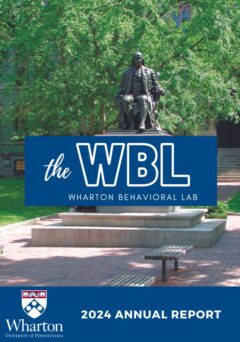Since 2005, the Wharton Behavioral Lab (WBL) has provided faculty and doctoral students with dedicated research environments in which to test their theories on business-related topics.
The primary goal is to enhance research productivity by minimizing operational costs, in both time and money. The Behavioral Lab accelerates faculty exploration of business-related issues in two ways: by providing the latest tools and learning technologies for behavioral and experimental studies and pooling resources across virtually all Wharton behavioral researchers to substantially lower operational costs. These hallmarks of the Behavioral Lab help to expedite both faculty research and the application of that research.
 “The Wharton Behavioral Lab has made my most ambitious research possible. It’s an incredible resource for faculty and doctoral students and makes us the envy of all our peers at other elite business schools.”
“The Wharton Behavioral Lab has made my most ambitious research possible. It’s an incredible resource for faculty and doctoral students and makes us the envy of all our peers at other elite business schools.”
KATY MILKMAN
Evan C. Thompson Endowed Term Chair for Excellence in Teaching
History
Prior to the Wharton Behavioral Lab (WBL), Wharton faculty spent a significant portion of their time recruiting participants and executing studies, thereby limiting their creative capacity to design and pose studies. At the same time, the School faced several challenges regarding behavioral research, such as recruiting new faculty in the field and allocating research dollars. In response to these growing challenges, Wharton created the WBL.
The WBL in its current form began in Spring 2005 with a single lab located in Jon M. HuntsmanHall (JMHH). The initial proposal estimated that the research volume would range between 5,000 and 14,000 participant-hours annually (with the lower number being the 2005 volume). In the first year, actual volume exceeded those estimates and a second location was added in Steinberg-DietrichHall (SHDH). This immediate high volume was interpreted as evidence that the WBL addressed a major deficiency in research support that had slowed the rate of research productivity and/or reduced the sample sizes used in behavioral research projects. In 2020, the on campus volume was over 30,000 participant-hours and online volume was over 1,000,000 completed surveys/experiments. This growth since 2005 has resulted from increased numbers of faculty doing behavioral research and increased volume per researcher.
The WBL serves as a key to unlocking vast impact from the research of Wharton’s faculty. Since opening in 2005, the WBL has established itself as the preeminent laboratory of its kind, attracting faculty and doctoral students from around the world. The Wharton School is the leading place for behavioral research with over 55 faculty utilizing the WBL on a regular basis.
The WBL provides faculty and doctoral students a dedicated research space, experienced staff, and financial resources to support behavioral, business-related research. The scale of the WBL enables Wharton to efficiently and profoundly boost faculty research productivity.
Connect with Us
Wharton Behavioral Lab
Steinberg Hall – Dietrich Hall
3620 Locust Walk
Suite 400
Philadelphia, PA 19104




